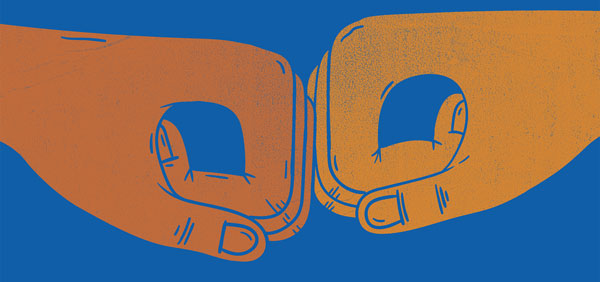Watching the movie "Something's Gotta Give" last night got me thinking about power paradigms and how they play out among individuals and within small businesses. In the movie, Jack Nicholson portrays a 63-year-old over-the-top stereotypical playboy who only dates 20-something women. He is simultaneously an anachronism and a highly sympathetic character in the movie, partly because the one 20-something relationship we see him in is one in which the woman enjoys a balance of power with him.
Balance of power. This is the thing that determines the difference between an off-color joke and a sexual harassment. Balance of power differentiates between a fist-fight and an assault, an argument and an attack, a gamble and a fraud. Every business owner, manager, and supervisor must be acutely aware of the balance of power between them and their subordinates.
My particular reason for thinking about this issue now is that this super-heated political season has brought to my attention numerous instances of employees feeling discomfort and dismay over the political climate at their places of work. After spending many years as the only center-left member of an organization with far-right ownership, I can certainly relate to the tip-toeing and side-stepping one must do to avoid an argument that has no value to the business at hand. But for people reporting to a supervisor, manager, or worse - business owner - who holds political opinions significantly different from their own, the discomfort goes beyond the desire to avoid fruitless discussion. It touches on their fears about keeping their job or being considered viable for promotion. The imbalance of power can turn political discussion and pressure into a form of abuse.
The same is true for holding forth on religious beliefs, divisive social issues, or any other non-business - and therefore unnecessary - topic. Even if you would never discriminate against someone because their belief system is different than your own, it is the mere perception of threat - due to imbalance of power - that causes employees to feel threatened or uncomfortable.
The primary goal of a business is to create value for its customers, and each business relies on its employees to deliver that value. Employees who feel respected, safe, and appreciated do a much better job of delivering customer value than employees who feel compelled to put up self-protective walls. One way to cultivate happy, confident employees is to tell them to leave the political buttons, cause t-shirts, religious missives, and other non-business messages and opinions at home. Let them know you respect and honor each member of your organization, and part of that respect means allowing them to feel safe and harmonious at work so they have energy and motivation to pursue their individual interests and causes when they are off the clock.
Beyond avoiding unnecessary conflict at work, keeping divisive topics out of the workplace will yield one other essential benefit: Creativity. The more commonality a community enjoys the less creativity that community puts out, so the more diversity you can encourage in your people the more that creative sparks are likely to fly.
Which only sort of explains why Diane Keaton's character in the movie would ultimately choose Jack Nicholson over Keanu Reeves. That part of the movie just didn't make sense to me. But hey, the point is, to each her own, right?
(c) 2010. Andrea M. Hill











